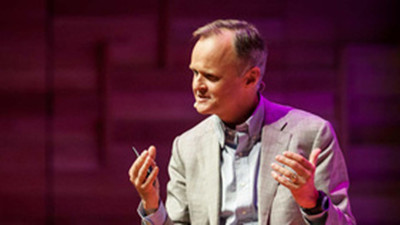The United States has, for many diseases,
事实上,美国在很多疾病上,
actually a quality which is below the average
的保健质量是低于OECD平均水平的。
Now, if the American healthcare system would focus a lot more on measuring quality,
那么,如果美国医疗系统致力于做更多的质量评价,
and raise quality just to the level of average OECD,
并且把质量提高到OECD的平均水平,
it would save the American people 500 billion U.S. dollars a year.
可为美国人民缩减每年五千亿美元的开支。
That's 20 percent of the budget,
这占到了美国整个国家,
of the healthcare budget of the country.
医疗保健预算的20%。

Now you may say that these numbers are fantastic, and it's all logical,
你可能会说,这些数字看上去很美,也符合逻辑,
but is it possible?
可这现实吗?
This would be a paradigm shift in healthcare,
这将是医疗保健的模式改变,
and I would argue that not only can it be done,
我认为,这不仅可以做到,
but it has to be done.
而且必须做到。
The agents of change are the doctors and nurses in the healthcare system.
而医生和护士将是医疗系统变革的主力。
In my practice as a consultant,
在我做顾问期间,
I meet probably a hundred or more than a hundred doctors and nurses and other hospital or healthcare staff every year.
我每年要接触上百名医生,护士,以及医院职工。
The one thing they have in common is they really care about what they achieve in terms of quality for their patients.
他们有着一个共同点,就是他们真正最关心的是如何保障病人的医疗质量。
Physicians are, like most of you in the audience,
医生和在做的各位一样,
very competitive.
是非常有竞争意识的。
They were always best in class.
他们一直是班上最优秀的,
We were always best in class.
我们总是班上最优秀的。
And if somebody can show them that the result they perform for their patients is no better than what others do,
如果有人能告诉他们,他们的医疗效果并不比其他医生强,
they will do whatever it takes to improve.
他们将不惜一切来改善现状。
But most of them don't know.
但是他们很多人不知道。
But physicians have another characteristic.
医生还有一个特点,
They actually thrive from peer recognition.
他们喜欢得到同行的褒奖。
If a cardiologist calls another cardiologist in a competing hospital and discusses why that other hospital has so much better results, they will share.
如果一个心脏科医生向另一家竞争医院的心脏科医生咨询为什么他们的治疗效果更好,他们会分享经验。












